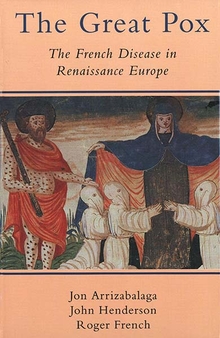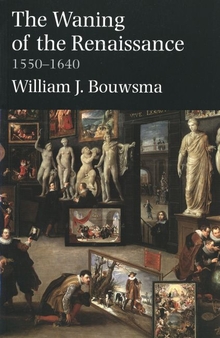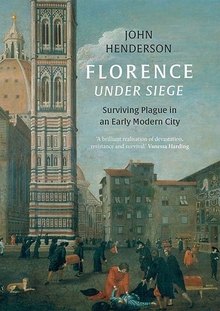The Great Pox
WARNING
You are viewing an older version of the Yalebooks website. Please visit out new website with more updated information and a better user experience: https://www.yalebooks.com
The French Disease in Renaissance Europe
Jon Arrizabalaga, John Henderson, and Roger French
In this new study, three experts explore the impact of the new plague and society's reaction to its challenge. Using a range of contemporary sources, from the archives of charitable and sanitary institutions that coped with the sick to the medical tracts of those who sought to cure it, they provide the first detailed account of the experience of the disease across Renaissance Italy as well as in France and Germany.
The authors analyze the symptoms of the Great Pox and the identity of patients, richly documented in the records of the massive hospital for "incurables" established in early sixteenth-century Rome. They show how it challenged accepted medical theory and practice and provoked public disputations among university teachers. And at the most practical level, they reveal the plight of its victims at all levels of society, from ecclesiastical lords to the diseased poor who begged in the streets. Examining a range of contexts from princely courts and republics to university faculties, confraternities, and hospitals, the authors argue powerfully for a historical understanding of the Great Pox based on contemporary perceptions rather than a retrospective diagnosis of what later generations came to know as "syphilis."
"The disease was syphilis, and the aim of this innovative, scholarly study by three distinguished medical historians is to assess responses to it in the first few decades of the sixteenth century. . . . A work in which original scholarship sheds new light on one of the darker sides of the Renaissance."—Roy Porter, Literary Review
"An impressive scholarly study of how laypeople and physicians reacted to a dangerous new disease in Renaissance Europe—syphilis. . . . A magnificent work of Renaissance scholarship."—Library Journal
"The Great Pox is a work of scholarly nuances and diversified themes. Its illustrations include vivid depictions of invalids, prostitutes, flagellants and hospital wards. Amid such rich material the social position of the sick emerges as especially interesting. Syphilitic patients did not die rapidly, but were left in lingering ill-health with slow disablement."—Richard Davenport-Hines, The Times (London)
"Arrizabalaga, Henderson, and French offer a great deal of period detail. . . . They are most concerned with the differing responses of doctors, municipalities, the Church, and royal courts to the disease. For those interested in such matters, there is much that is fresh and intriguing here."—Kirkus Reviews
"A rich book, elegantly written, a learned work, and as comprehensive as one could wish on the subject of an unidentifiable illness."—Ruth Rendell, Daily Telegraph
"This meticulously researched and in many ways remarkable book tells the story of the pox in Europe and draws several parallels with modern day reactions to the problem of AIDS."—Kiernan Cooke, Financial Times
"[A] considerable contribution. . . . The book's rich perspective embraces social, psychological, political, theological and civic responses to the disease; and the reactions of medical practitioners and authorities in different cities and countries. . . . [A] substantial book."—Bernard Dixon, The Sunday Times
"The scholarship is detailed and precise in its elucidation of past disputes, and breaks new ground in its survey of Italian hospitals. Henderson deftly disentangles the complex of motives, religious, charitable, political, personal, and reformist, that led to the creation of hospitals for the venereally sick. . . . [The Great Pox] extends considerably our knowledge of venereal diseases in the past."—Vivian Nutton, Times Literary Supplement
"For researchers, historians, sociologists, theologians, public health practitioners, medical writers, anybody involved in the fight against AIDS, and followers of Santayana's dictum, this work, with its superb scholarship and bibliography, has much to offer."—Ruben D. Rumbaut, JAMA (Journal of the American Medical Association)
"More than a history of syphilis, this is a story of the disease as it was perceived by various components of Renaissance society and their reaction to it in light of the culture of the time. . . . A scholarly, informative and intelligent book with unique insight into the early history of a disease that took four centuries to be identified, and another 50 years to be treated."—Choice
"The text is rich, detailed, and extensively referenced, with graphs, tables, and a number of photographs and prints. . . . For the meticulous historian, historian-physician, or anyone seeking a specific reference on the history of the Great Pox . . . the book may prove invaluable."—Faith T. Fitzgerald, New England Journal of Medicine
"The study offers masses of stimulating material that will be useful to early modern specialists. . . . It is a rich book that breaks much new ground and furthers our understanding of early modern culture."—Robin B. Barnes, History
"A great book. It is to be highly recommended, sought out, read with pleasure, studies with care."—Bibliothèque d'Humanisme et Renaissance
"The book makes many excellent contributions to wider debates about medicine in this period. . . . The book brilliantly succeeds in locating the French Disease firmly within European medicine of the period."—Helen King, Social History of Medicine
"This text serves as a good example of the spread and devastation of disease in the absence of knowledge of the etiology and pathogenesis of the process."—Francis E. Cuppage, Modern Pathology
"[A] splendid history. . . . This is a convincing, rewarding and authoritative account of the first century of one or more disease phenomena in Europe."—Ann G. Carmichael, Medical History
"The Great Pox is an extremely useful and informative study, one which, because of the approach adopted, will be of interest not only to historians of medicine but to anyone engaged with the history and culture of the Renaissance."—Gary Ferguson, University of Delaware, Sixteenth Century Journal
"An admirable book."—Nature
"This book is a study in the history of medicine that . . . remains very readable and accessible to the public"—Negib Ayachi
"In its scholarship and its attention to local detail, this book sets a high standard for future studies of the French disease."—Katherine Park, American Historical Review
"Instead of seeking to identify the timeless "essence" of the disease, [Arrizabalaga, Henderson and French] focus upon the historical circumstances in which knowledge of the illness was built up. This approach leads them much farther afield than traditional histories of medicine."—William Eamon, Renaissance Quarterly
"[A] highly successful interpretation of the devastating effects of the great pox on the inhabitants of early modern Europe."—Lynda E. Stephenson Payne, The Hi
"The authors are to be congratulated for producing an extremely learned and informed book. . . . Through their analysis of the growing interest in an ontological theory of disease, the authors demonstrate how a novel pathological conundrum (especially the problem of how the pox was transmitted) can move the medical debate on."—L.W.B. Brockliss, Journal of Modern History
Publication Date: September 2, 2014
34 b/w illus.










